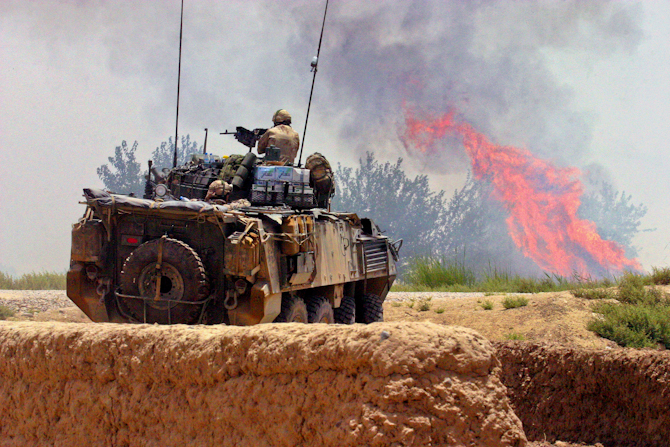
The withdrawal of NATO troops is putting increasing burdens on the Afghan security forces. – Ethan Baron photo
It’s not every day that business school students help fight a war – and save American taxpayers tens of millions of dollars. For the first time ever, UCLA’s Anderson School of Management has conducted an operational review of an overseas military operation. Under Anderson’s Strategic Management Research field study program, five Executive MBA students analyzed NATO’s training program for Afghanistan’s air force, to create a business plan to improve training and cut costs.
THE CHALLENGE: OPERATING A TRAINING PROGRAM IN A WAR ZONE
“We reached out to smart people,” says U.S. Air Force Brig.-Gen. John Michel, just-departed commander of NATO Air Training Command – Afghanistan. “They brought a disciplined way of thinking, a disciplined methodology, to a very difficult challenge.” Difficulties went beyond operating a training program in a war zone where transporting equipment and people is far more expensive and dangerous than in a peace-time environment. Afghan pilots and aircraft maintainers often relied on unreliable or limited-hours public transportation to get to training sessions, many spoke little or no English, and the Afghan security forces have a well-documented problem with desertion. Also, the aircraft used for training had to come from the pool of those used for war.
“You don’t want to take those out of the fight,” says UCLA team member Rick Smith, a former Marine who served in Iraq.
The stakes were high: the U.S. defense department and NATO intend that the Afghan Air Force use its 150 planes and helicopters to play a key role in securing the country against the Taliban insurgency, through combat insertions of Afghan commandos, evacuation of wounded soldiers, and resupply of fighting troops.

The U.S. and NATO intend for the Afghan Air Force to play a crucial role in supporting ground troops against Taliban insurgents. – Ethan Baron photo
“They need to be able to utilize that force day in and day out in operations,” Michel says. For Anderson EMBA students, the mandatory Strategic Management Research program makes up 10 of their 70 units, and is considered the “thesis” of the 22-month program, says school spokesperson Elise Anderson. Other students’ SMR projects at the time included marketing Broadway show stage materials, examining 3-D printing possibilities for pharmaceutical products, and defining the business case for a major defense company’s possible entry into the high-throughput satellite market.
OTHER FIELD STUDY PROJECTS TARGETED 3-D PRINTING, BROADWAY SHOWS, AND SATELLITES
Recommendations from the Afghanistan project team – Smith, Andreas Neuman, Saigovind Dandapani, Guy Cohen, and Pete McKeever – solidified a plan that, if adopted, will save an estimated $100 million. “This coalition of the unlikely netted some pretty significant fruit,” Michel says.

The “coalition of the unlikely” (L-R): Saigovind Dandapani, Richard Smith, Guy Cohen, Peter McKeever, Andreas Neuman. – Elise Anderson photo
For the EMBA students, the critical task was to come up with a plan that would help the Afghan Air Force stand on its own, with a much smaller training budget, after the U.S. pullout at the end of this year. “We really delved into the contracting process of the United States Air Force and defense department,” says Smith, one of the four team members with a military background. “What we actually found was they actually have great processes. But those procedures often get sidestepped when you’re in a war zone environment and everything needs to be done ‘now now now now.’
“A lot of the people that were in the buying process didn’t even have the knowledge to procure in the manner the government mandates.”





Questions about this article? Email us or leave a comment below.